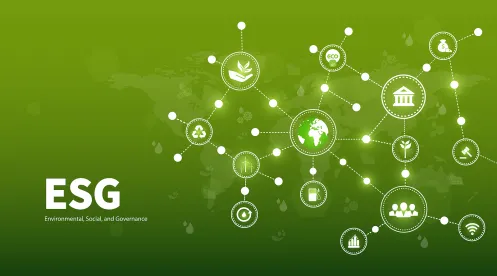Companies of all sizes are increasingly scrutinized on adherence with Environmental, Social, and Governance (“ESG”) metrics. In particular, manufacturers and customers at both ends of the supply chain are evaluated on metrics related to their ethics practices related to the promotion of human rights and environmental sustainability. A recent survey of over 500 executives found that 80% of supply chain executives are increasing their efforts toward sustainable supply chain operations with the goal of reducing risks, increasing innovation, and generating a stronger return on investment for their stakeholders. Understanding, documenting, and strengthening ESG metrics that promote an ethical supply chain will likely be key to a company’s long-term viability. Applicable metrics include reducing environmental impacts, promoting sustainable practices, addressing labor rights, and combating modern slavery.
Reducing Environmental Impact and Promoting Sustainable Practices
Addressing sustainability in supply chains can unlock a company’s sustainability potential because the supply chain accounts for more than 90% of most consumer goods companies’ environmental impact. Over 60% of the corporate members of the Carbon Disclosure Project used environmental metrics to both inform supplier management and to hold their business partners accountable to supply chain sustainability goals.
Moreover, consumers are increasingly demanding sustainability when choosing where to spend their money. Nearly half of U.S. consumers say they would change purchasing habits in order to reduce their impact on the environment. In addition, researchers at MIT’s Sloan School of Management found that consumers are more concerned than ever about where products come from and how they’re produced and estimate that consumers may pay 2-10% more for products that provide supply chain transparency.
Beyond stakeholder and consumer demand, governments are increasingly regulating and imposing requirements relating to the sustainability within supply chains. In the U.S., California recently passed the Climate Corporate Data Accountability Act, the Greenhouse Gases Climate-Related Financial Risk Act and the Voluntary Carbon Market Disclosures Act requiring certain climate-related disclosures. The Climate Corporate Data Accountability Act requires business entities with total annual revenues above $1 billion and doing business in California to publicly disclose their Scope 1 and Scope 2 greenhouse gas (“GHG”) emissions on an annual basis beginning in 2026, and their Scope 3 GHG emissions, i.e. all supply chain emissions, beginning in 2027. The Greenhouse Gases Climate-Related Financial Risk Act requires businesses with total annual revenues above $500 million doing business in California to prepare a climate-related financial risk report disclosing the entity’s climate-related financial risk and measures adopted to mitigate such risk.
The Voluntary Carbon Market Disclosures Act applies to companies that: (a) have made public claims about achieving net zero emissions, being carbon neutral or similar; (b) use voluntary carbon offsets to make carbon emission claims; or (c) operate a business that markets or sells voluntary carbon offsets. The Act requires these companies to make disclosures on their website for each offset program or project, including all information related to how the company determines such net-zero, “carbon neutral,” or other similar claims are accurate; how progress toward such goals is measured; and whether there is independent third-party verification of the data and claims. This Act applies to all businesses regardless of revenue size and became effective January 1, 2024.
While the U.S. Chamber of Commerce and other parties have filed suit against the California Air Resources Board challenging these laws, they may serve as a bellwether that governments are willing to demand sustainability related information about supply chains. The challenge related to these California disclosure laws is ongoing as of February 2024.
In the European Union (“EU”), importers of tin, tantalum, tungsten, and gold are required to report on supply chain due diligence obligations under the Conflict Minerals Regulation, which was established in 2021. In the E.U., the European Carbon Border Adjustment Mechanism imposes a charge on certain products imported from non-EU countries for emissions released during the product’s production. The Adjustment applies to the importation of iron, steel, aluminum, cement, electricity, and fertilizers from non-EU countries. The law also applies to processed goods made from these products. Importers are required to submit a declaration of the quantity of emissions associated with the covered imports and, starting in 2026, imports may be subject to a carbon charge.
The EU also proposed the Corporate Sustainability Due Diligence Directive in 2022, which would require the implementation of a sustainability due diligence strategy to identify, prevent, end, mitigate and account for adverse environmental impacts (as well as human rights impacts) across global value chains. This Directive applies to EU companies, including EU subsidiaries of non-EU parent companies, that have more than 500 employees and a net global turnover of more than EUR 150 million or more than 250 employees and a net global turnover of more than EUR 40 million with 50% of turnover generated in a high-risk sector, which are textiles, clothing and footwear, agriculture, forestry, fisheries, and food.
The EU’s Regulation on Deforestation also impacts supply chains. This regulation applies to operators, traders, and authorized representatives of cattle, cocoa, coffee, oil palm, rubber, soya, and wood products. The Deforestation Regulation was published in the EU’s official journal on June 9, 2023, and entered into force on June 29, 2023. The main prohibitions of this regulation will come into effect on December 30, 2024.
Labor Rights and Combating Modern Slavery
Addressing labor matters and eradicating slavery for every product in the supply chain is a key metric for creating a sustainable supply chain. Sustainability practices help support supply chain resilience during vulnerable or challenging periods and ensures that a company remains viable and successful in the long term. A key element of a sustainable supply chain is one that relies on ethical labor practices because governments are increasingly cracking down on slave and forced labor. In 2018, the U.S. Department of Labor listed 148 types of goods from 76 countries produced by child labor in its Comply Chain app to help American businesses eliminate child labor from their supply chains.
The U.S. Uyghur Forced Labor Prevention Act requires the Customs and Border Protection Agency to apply a rebuttable presumption that any goods, wares, articles, or merchandise imported from the Xinjiang Uyghur Autonomous Region (“XUAR”) were mined, produced, or manufactured wholly or in part by forced labor. This Act applies to all importers who seek to bring goods from the XUAR region, in particular cotton and tomatoes. Unless precleared under the statute, suspect goods will be detained and the importer will be required to provide documentation within 30 days of importation of clear and convincing evidence that the goods were not a product of forced labor.
Also in the U.S., California passed the Transparency in Supply Chain Act, which requires large retailers and manufacturers doing business in California to disclose efforts to eradicate slavery and human trafficking in their direct supply chains for tangible goods offered for sale. The Act applies to companies that meet all the following criteria: 1) identifying themselves as a retail seller or manufacturer on its California tax return; 2) conducting business in California; and 3) having annual worldwide gross receipts of more than $100 million.
In the United Kingdom (“UK”), the Modern Slavery Act was established in 2015 and sets legal requirements for companies to identify, prevent and mitigate modern slavery in their own operations and supply chains. In addition, the UK Gender Pay Gap Reporting requires annual reporting on the differences related to male and female employees for: hourly pay, bonus proportions, bonus amounts, and proportions of employees in quartile pay bands.
These initiatives are all aimed at increasing transparency around how human labor is treated in every step of a given company’s supply chain.
Conclusion
Sustainable supply chains are not only required by governments throughout the world – in many instances they are required for resilient businesses. While many laws in the U.S. aimed at sustainable business practices or other ESG metrics are facing challenges, new laws addressing these issues are being promulgated throughout the globe at a rapid pace and supply chain executives routinely indicate that sustainability matters are top of mind. Sustainability concerns are now a permanent part of doing business in a global economy. Developing strong policies around procurement, operations, data, and communication, including policies with respect to third-party supplier audits, independent testing for supplier materials, or supplier certifications, can support the overall sustainability of a company’s supply chains. Regulators, lenders, and investors will likely continue to scrutinize a company’s ESG policies and adherence to them when evaluating a company’s strengths, risks, and projections for future performance.




 />i
/>i

